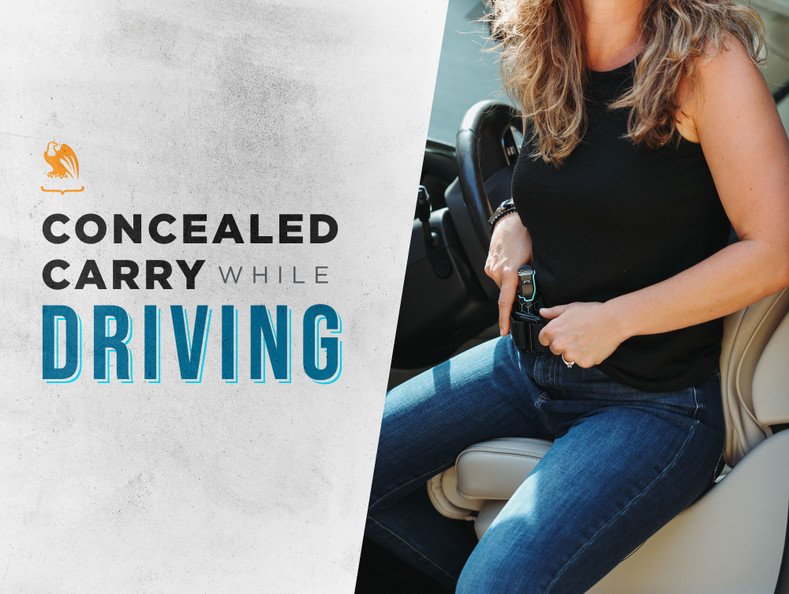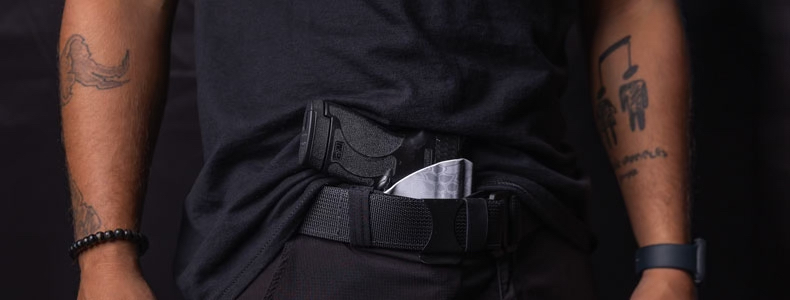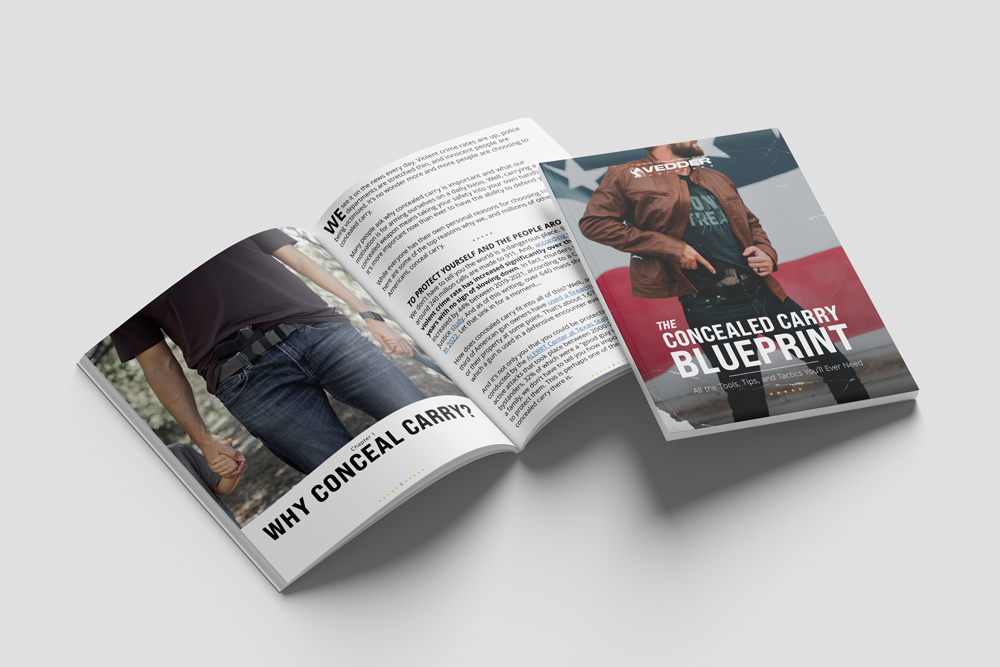Guide to Car Concealed Carry: Everything You Need to Know Before Hitting the Road

We live in an era where driving is almost as normal as sleeping.
The average American spends approximately 22,000 hours behind the wheel in their lifetime. And that number is significantly higher for those who drive for a living or have longer than average commutes.
When you factor in the added risk of becoming a victim while on the road, it’s no mystery why people want to keep their self-defense pistol on hand while driving – whether down the street or across the country.
But car concealed carry is not without its complications. There are plenty of legal factors to consider when driving with a weapon, crossing state lines, renting a car, and even passing through school zones. Not to mention the added challenge of carrying and drawing from inside a vehicle.
So, without further ado, here is everything you need to know about how to conceal carry while driving.
Products Mentioned In This Article
Can You Carry a Loaded Gun in Your Car?
First, we need to establish whether or not you can carry a loaded gun in your car in the first place, and the answer is: it depends.
When it comes to carrying loaded weapons in your vehicle, every state is different and there are often several factors to consider, such as the type of firearm you have and whether you will carry it concealed or openly.
In some states, as long as you are legally allowed to carry a weapon, you can transport a loaded gun in your vehicle. In other states, the rules are stricter, and you may need a permit or to follow certain guidelines when transporting a loaded (or unloaded) firearm.
The best thing to do is check out the laws where you live to see what qualifications are required to have a gun in your vehicle. Keep in mind that there is a difference between concealed carry and simply transporting a weapon, and the rules are likely different.

What is Considered Concealed Carry While Driving?
There is a difference between concealed carry and transporting your firearm in a vehicle, say, to a shooting range, to go hunting, or even on your way home from the gun shop. This is an important distinction to make, as the laws for each are very different in most places.
As a general rule, any time you’re carrying a gun that isn’t visible, you are concealed carrying and will need a permit to do so (unless you live in a constitutional carry state). That includes carrying a pistol under your jacket, inside your waistband, in a purse or backpack, and –yes – in your vehicle.
When your gun is carried in a way that can be seen by others, it is considered open carry, and a whole new set of rules apply. Many states have exceptions for people simply transporting a firearm, and the regulations for that are different still (we’ll talk about that more in the next section).
No matter what you plan to do, double-check with your state laws first to determine which category your method of carry falls under, and what rules you need to follow.
Can I Carry a Gun in My Car Without a Concealed Weapons Permit?
The answer to this question is entirely circumstantial, and, again, comes down to where you live and what you’re doing.
If what you’re doing is considered concealed carry, then you will be required to have a CCW permit if you live in a state that requires one. If you are simply transporting a firearm from point A to point B and are following all of your local regulations in doing so, then you shouldn’t need one.
For example, if you don’t have a CCW license in a state that requires one for concealed carry, you may still be allowed to transport a gun in your vehicle so long as it is unloaded, stored in a case, and carried in a secure location like your trunk or glove compartment.
Start by looking into the regulations in your state to determine which category you fall under, and the specific laws and specifications surrounding each.
What is the Penalty for Carrying a Concealed Weapon in a Car Without a Permit?
If you live in a region where a license is required for concealed carry, you better believe there will be consequences if you’re caught carrying a gun without one.
The actual penalties involved will depend on your location and the severity of the crime, meaning how and where you violated the rules and what other factors were involved.
If you’re caught concealed carrying without a license, whether in your vehicle or not, you could face criminal charges ranging from a misdemeanor to a felony depending on your state, as well as some hefty fines.
Either way, it’s definitely not worth the hassle. If you intend to conceal carry, it’s important to do it the right way by signing up for a class and applying for a permit. You can learn more about the process, and where to find classes near you, on the USCCA’s website.
Do I Need a Car Concealed Carry Holster?
You may have seen a wide range of concealed carry holsters specifically designed for vehicles. While these little gadgets may sound like a great idea, they aren’t recommended for a number of reasons.
Car concealed carry holsters are designed to be mounted in different areas of your vehicle to allow for easy access while driving. Some of them consist of magnetic strips, while others secure your weapon in a holster-like shell or strap.
The problem with using your car as a holster as opposed to carrying on body is that your weapon is now vulnerable to theft and unauthorized use, while also being harder to access in an emergency. Plus, if you have to get out of your vehicle for any reason, you’ve just lost access to your protection.
The best way to conceal carry in your vehicle is the same way you carry everywhere else – on your person. If you need a comfortable holster for car concealed carry, check out our entire collection of Vedder Holsters Kydex IWB, OWB, and pocket carry holsters.
What Is the Best Concealed Carry Position for Driving?
There are two factors to consider when choosing a concealed carry position for driving: access and comfort.
In terms of comfort, think about the way you’re positioned while sitting down, and the parts of your body that come in contact with your seat. For example, while appendix carry is known for being a relatively comfortable carry position, that might not be the case while sitting for long periods as your gun may start to dig into your stomach and thigh after a while.
Similarly, while the 4-5 o’clock position is easy to conceal and fairly comfortable most of the time, you may find that having a gun in this position will start to hurt when it’s wedged between you and your car’s front seat. It’s also difficult to access from a seated position, and may even start to wear out your upholstery after repeated trips.
Though harder to conceal while out and about, the 3 o’clock position, or “strong-side” carry, is hands down one of the most comfortable carry positions for driving. However, depending on the size of your vehicle and how much space you have between you and your center console, you may find it difficult to draw from.
One carry position that is often recommended for driving is cross-body. While this isn’t an overly common way to carry in a typical setting, it is both comfortable and easy to draw from while seated, making it a great option if you plan to be in the car for hours at a time.
Finally, while off-body carry isn’t always recommended, it does have a place in car concealed carry – especially if you’re driving long distances. Keeping your gun in a purse or bag next to you while driving can still allow for easy access while being exceptionally comfortable since it’s, you know, not on your body.
The easiest way to determine the best driving carry position for YOU is to try a few things until you find what works. Everyone is built differently, drives a different car (unless you have a Toyota Camry, then everyone drives your car), and carries a different gun. So what works for one may not work for another.
Check out our blog for more tips on how to comfortably conceal carry while seated for long periods.

What is the Best Pistol for Car Concealed Carry?
There are countless factors that go into choosing the best gun for your needs. Because everyone has different preferences when it comes to CCW, it’s impossible to choose a single “best” pistol for car concealed carry. However, there are a few things to look out for.
First, if you intend to conceal carry while driving on the regular, you may want to consider investing in a smaller weapon. Big guns are fun, but they’re also extremely uncomfortable when sitting for long periods, as they tend to dig into places they shouldn’t.
Depending on your carry position of choice, you might want to carry a pistol with a shorter barrel as well. Because a gun’s barrel tends to be the main problem when it comes to discomfort while sitting, the shorter the barrel, the more comfortable it will be.
To learn more about popular concealed carry pistols and compare popular models, check out the product guides on our blog.
Can I Leave My Gun in My Car?
Generally speaking, as long as you are legally allowed to carry concealed, you can leave your gun in your car. However, different rules may apply, and it’s not necessarily a good idea anyway.
Some states have no specific requirements regarding car CCW, so long as you’re legally allowed to conceal carry in the first place. Some require you to keep your gun on you at all times while in the vehicle, while still others mandate all handguns be kept in a case and may even need to be unloaded with the ammunition stored separately – it all depends on where you live.
That’s all fine and dandy if you’re running into a store real quick, but can I leave my gun in my car overnight? Yes, again, it depends on whether your state requires you to have your firearm on your body while concealing a weapon in a vehicle.
Even if you can leave your gun in your car, that doesn’t mean you should. If your pistol is in your vehicle while you’re not, it’s at risk of being stolen – even if you lock your doors. Any time you let a passenger into your car, you’re also risking your gun finding its way into the hands of an unauthorized user.
So, if you plan on keeping a gun in your car, you may want to invest in a small safe to help keep it secured. We recommend a combination safe, like those made by StopBox USA, or a biometric safe, like those by Vaultek. There are also plenty of other options available online.
Can You Travel Between States While Concealed Carrying?
If you’re a road trip enthusiast, you may be wondering about the logistics of concealed carrying across state lines.
The good news is that more often than not you can absolutely travel through multiple states with your CCW so long as you have a valid concealed carry license. Many states have “reciprocity” agreements with other states, meaning they honor concealed carry licenses issued by each other.
That being said, every state has different rules, and not all of them recognize permits from other states, or do with some restrictions.
If you’re planning a trip, make sure you check that the states you’ll be traveling through honor concealed carry permits from your state and read up on any exceptions or additional regulations you’ll need to follow.
The USCCA has a handy reciprocity map that allows you to quickly see which states recognize the permit you have, so you can read up on everything you need to know.

Can I Have a Gun In My Car on School Grounds?
If you have kids, you’re no stranger to sitting in long school pickup lines waiting for your little tots to come running out, backpacks in tow. But what happens if you have your CCW on you? Is it illegal to concealed carry on school grounds, even if you never leave your car?
If you do not have an active concealed carry license, it is federally illegal to bring a firearm onto school grounds or within 1,000 feet of one, according to the USCCA. If you are licensed, there are no federal laws prohibiting you from concealed carrying on campus.
However, each state and municipality has the right to impose its own restrictions regarding concealed carry on school grounds, and the vast majority of states do not allow it, regardless of your CCW permit status.
Some states do allow you to have your concealed weapon in your vehicle while in the school parking lot, but not all. So, before you attempt to carry on campus, check your state regulations, local ordinances, and even school district policies to ensure you’re doing so lawfully.
Can I Conceal Carry in a Rental Car?
Whether you need a vehicle on your travels or yours is in the shop, you’ll want to verify that you can have your gun before grabbing the keys to a rental car.
For the most part, you should be able to conceal carry in a rental car – most companies don’t have any specific rules against it. However, there are some businesses out there that prohibit firearms in their vehicles, so be sure to check the rental company's policies before hitting the road.
This should go without saying, but make sure you don’t forget your weapon in the rental before returning it. It does happen, even to experienced gun owners, so always double-check to be safe.
What Should I Do If I Get Pulled Over While Concealed Carrying?
Whether you’re running late to work or thought you could make that yellow light, flashing red and blue in your rearview mirror can send your heart plummeting. Don’t worry – it happens. But if you have your CCW on you at the time, should you inform the officer about it?
As a general rule, it’s considered a courtesy to let the officer that pulled you over know you have a concealed weapon in the vehicle. This is especially true if there is a risk they will see it when you go to grab your license and registration out of your purse or glove compartment. The last thing you want is for the officer to feel threatened by thinking you’re reaching for your Glock and not proof of insurance.
But do you have to inform the police about a gun in your car? Well, that depends on the state you’re in at the time.
In some states, you have an obligation to disclose, otherwise known as a “duty to inform.” This rule applies any time you encounter a law enforcement officer while concealed carrying – whether walking down the street or sitting in your car.
Some states only require you to disclose your weapon if the officer specifically asks, while in others you’re not obligated to tell them at all. Before driving with a gun in the vehicle, check your local laws to find out what you have to do if you get pulled over to avoid a ticket, jail time, or worse – the endangerment of yourself, the officer, or others.

What Are the Car Concealed Carry Laws in My State?
Like everything else firearm-related, the laws surrounding concealed carry while driving differ in every state. So, how do you find out what the rules are where you live?
The best way to find out more about your local CCW regulations is to visit your state’s website and read the laws for yourself. Taking a concealed carry class is another great way to get an overview of the rules and ask specific questions.
The U.S. Concealed Carry Association also offers an interactive map outlining the concealed carry and reciprocity laws in each state, which can help you better understand your local rules and plan accordingly if you’re traveling. ProCon.org also offers a state-by-state breakdown of concealed carry laws, and is an excellent tool to reference.
Summary
We spend a lot of time in our cars, and if you plan to carry a firearm, it’s important to know the rules and have a plan for safe and effective car concealed carry.
The first thing you should do before carrying in a vehicle is to check your state regulations for specific guidelines. After that, it’s important to decide how and where you plan to carry to make sure that you’re comfortable and your pistol is easy to access.
If you’re looking for a new IWB, OWB, or pocket carry holster for car carry, visit our Holsters by Gun Model page for Kydex holsters that are custom-made for your weapon of choice.
Interested in items beyond holsters? Check out our Resources Page for links to recommended products like lights, lasers, first aid, maintenance, and more, and browse our selection of apparel, and accessories at our website, vedderholsters.com.
To stay up-to-date on all the latest Vedder Holsters content and offerings, check out our blog and follow us on Facebook, Instagram, and Twitter. And be sure to visit our sister company, GeoGrit, for all of your American-made minimalist wallet needs.
*This page contains affiliate links. When you purchase a product included on this list, we receive a commission at no extra cost to you.



